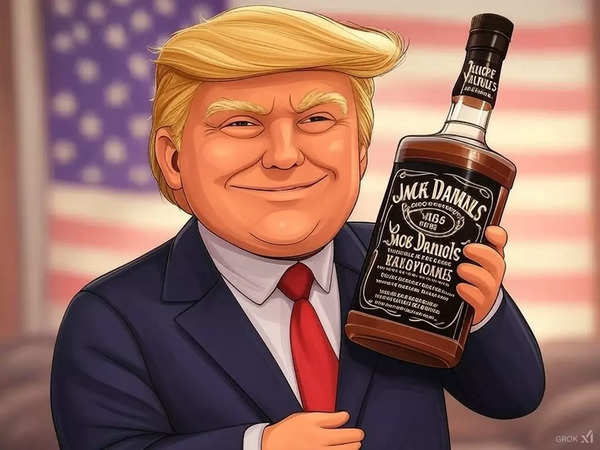Trade on the Rocks: Why American whiskey prices are set to rise in Europe | World News – The Times of India

Liquor lobbyists gathered in a swanky private club in Brussels on a rainy evening, discussing the mounting crisis for their industry. The mood was far from celebratory. The spirits sector was bracing for yet another trade battle—one that could send whiskey prices soaring.
This isn’t the first time liquor has been caught in a tariff war. Back in 2018, when Donald Trump imposed tariffs on steel and aluminum imports, the European Union retaliated with a 25% levy on American whiskey. The move, widely seen as a direct jab at Kentucky and its then-powerful senator, Mitch McConnell, was part of a broader tit-for-tat trade dispute that also affected rum, cognac, and other liquors.
Under Joe Biden, these tariffs were suspended in 2021, with an extension granted in 2023. But that grace period expires on March 31, 2025. If no deal is reached, a 50% tariff will automatically be applied to American whiskey exports—along with levies on motorcycles and other goods.
The spirits industry is ringing alarm bells. Distillers warn that these tariffs could devastate their export business, particularly in key growth markets like Germany and France. Retaliatory tariffs from the US could also follow, escalating the situation further.
Bars are already stockpiling bottles to brace for impact, while distilleries are putting expansion plans on hold. Industry leaders have been making rounds in Brussels, Washington, and Rome, where Giorgia Meloni has become Trump’s informal bridge to Europe, in a desperate bid to keep whiskey out of the crossfire.
The inclusion of whiskey in these negotiations, however, is no accident. Consumer goods like bourbon make for high-profile casualties in trade wars. The EU, aware of this, sees the tariffs as a strategic way to pressure the US without provoking an immediate trade conflict. The timing is also tactical—the EU is facing economic stagnation and wants to avoid a disruptive trade war while keeping Washington engaged on other geopolitical priorities, such as support for Ukraine.
Meanwhile, the Trump administration has already announced new 25% tariffs on steel and aluminum, set to take effect on March 12, 2025. Additional levies, including those targeting the EU, are reportedly being planned. European officials are debating their response, and for the spirits industry, the uncertainty is nerve-wracking.

Chris R. Swonger, CEO of the Distilled Spirits Council of the United States (DISCUS), has been lobbying European leaders, arguing that whiskey should not be caught in the middle of a trade dispute. He maintains that the industry exemplifies free trade and that punishing it is counterproductive.
But whiskey isn’t the only drink at risk. Mexican tequila and Canadian whiskey could also become bargaining chips as the US reconfigures trade agreements with its neighbors. Though tariffs on these spirits are currently suspended, their status is also set for review in March 2025.
The numbers paint a worrying picture. When the EU imposed its 25% tariff in 2018, American whiskey exports to Europe plunged by 20% in just one year. European liqueur and cordial exports also suffered steep declines, proving that trade disputes hurt both sides.
For smaller distilleries, the stakes are even higher. Victor Yarbrough, CEO of Brough Brothers Spirits Group in Louisville, Kentucky, had just started exporting bourbon to Britain in 2019 when tariffs took effect. The added costs made overseas sales unprofitable, forcing him to pull back. Now, he’s postponing plans to enter the French and German markets, unsure if it’s financially viable.
Yarbrough had been confident that his bourbons—one with cherry and chocolate notes, another with hints of apple—would appeal to European drinkers. But with uncertainty clouding the industry, he has no choice but to wait.
For consumers, the impact is straightforward: higher prices. Björn Lahmann, owner of Whiskyplaza in Hamburg, says American whiskeys are essential for classic cocktails like the Old Fashioned and Sazerac. If prices spike, customers will have to either absorb the cost or switch to non-American alternatives.
The EU, for its part, is doubling down on its key message: tariffs are bad for business and worse for consumers. European Commission President Ursula von der Leyen has emphasized that raising levies benefits no one.
Brussels hopes to negotiate with Trump’s administration by offering concessions, such as increased gas purchases, while keeping the threat of countermeasures on the table. But for now, the whiskey industry remains in limbo.
With the March 31 deadline looming, the question is whether trade negotiators will find common ground—or if whiskey lovers should start stocking up before prices soar.
Related
What’s at stake for American culture with Trump’s Kennedy Center…
In her two decades as a human rights lawyer, working on issues in more than 25 countries, Hadar Harris says she is alarmed by what she's witnessing on U.S. soil
Denmark lost 52 soldiers fighting alongside the US. Now it…
Nick BeakeEurope correspondentBBCAll his adult life, Colonel Soren Knudsen stepped forward when his country called. And when its allies did.He fought alongside
As Trump upends foreign policy, Berkeley scholar sees irreparable damage…
Last week’s Oval Office blowup with Ukrainian President Volodymyr Zelensky exemplified what many foreign policy experts have long feared: that th
Trump creates a task force for the North American 2026…
President Donald Trump creates a task force to prepare for the 2026 W











